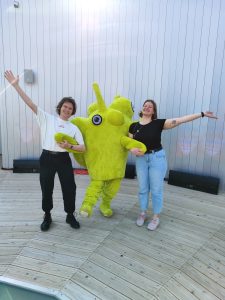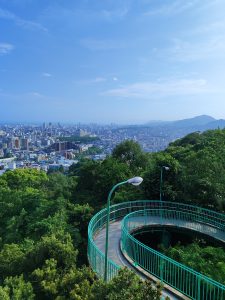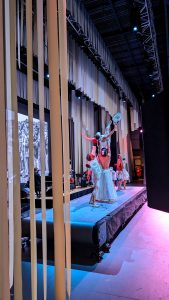What does everyday life look like at one of the world’s biggest exhibitions? What is it like to work in an environment where technology, culture, and thousands of visitors meet every day — while learning to navigate language barriers, different work rhythms, and completely new social customs?
EXPO 2025 in Osaka offers not only a unique presentation of countries from all over the world but also an incredible opportunity for students to gain hands-on experience in an international environment. Two students from the Faculty of Multimedia Communications at UTB, Simona and Šimon, became part of the Czech Pavilion team.
In this interview, they share their experiences with event organization, daily life at EXPO, and living in Japan. They openly talk about cultural differences, language barriers,and what this experience has brought them — both personally and professionally — and why they would recommend it to others.



What was your first impression upon arriving in Japan — whether from the city, the people, or the EXPO environment itself?
Simona:
“I felt like I was on a rollercoaster; I don’t know how else to describe it. Straight from the plane, we went directly to EXPO and only later to our accommodation. There were just a few days left before the grand opening, so there were countless details to finalize, and every extra pair of hands helped. I started noticing the beauty of the city and its surroundings only after the initial shock. What I couldn’t overlook, however, already on my second day on the way to EXPO, was how overcrowded the public transportation was. The sheer number of people was overwhelming!”
Šimon:
“My first impression was mainly about contrasts. Everything here is different compared to the Czech Republic — from small details, like traffic markers, advertisements, and vending machines on every corner, to massive buildings and infrastructure, not just around the EXPO site but across the whole of Osaka. It feels grand, yet surprisingly not chaotic. Everything has a clear order and system that makes it all work, even with thousands of people around at the same time. I think what surprised me most was how organized everything can feel at such a massive scale.”
What exactly does your internship involve? Is there something about the job you particularly enjoy or that surprised you?
Simona:
“Communication with partners and arranging access passes were my main responsibilities, along with helping wherever needed during conferences or even assisting with our mascot. I enjoyed every single day — I loved how lively the pavilion was. I was really surprised by the incredible interest visitors showed in the weekend cultural program, Czech beer, and our mascot René. It was a huge hit across all age groups!”
Šimon:
“At the beginning, I mostly handled administrative tasks — records, preparing documents — basically paperwork, which Japan still uses extensively and happily. Over time, I moved into event management and became the assistant to the event manager. That means coordinating event preparations, communicating with organizational representatives, solving logistical issues, and overseeing the smooth running of the events. I enjoy the fact that this job alternates between calm, preparatory days and intense, hectic moments when everything happens in real time.”
What does a typical day at EXPO look like? Is it more of a routine, or does each day bring something new?
Simona:
“I’d call it a constantly changing routine. There are things that need to be handled every day, but what changes is who you’re working with and for whom. And then there are the unexpected, one-off tasks from completely different areas! Every day brings a different partner, guest, or event.”
Šimon:
“It really depends on whether there are events scheduled. During calmer periods, it’s more of a routine — office work, answering emails, meetings, coordinating schedules, and preparing materials. But once an event day arrives, everything changes. From morning till evening, I’m on my feet, handling organizational matters, communicating with teams, and making sure everything goes smoothly. Flexibility is an absolute must on these days, and you have to be ready for the fact that even a perfectly planned schedule might need instant changes.”
During your internship, did you encounter anything that completely surprised or shocked you — either positively or negatively?
Simona:
“The terrace of the Czech Pavilion has a stunning view of the water show, fireworks, and drone displays. But I was shocked when the fountain performance was suspended for about a month due to the discovery of Legionella bacteria in the ‘Sea of Connections.’ That, along with the sheer number of visitors each day, surprised me the most.”
Šimon:
“Definitely the language barrier. I expected to get by with English, at least in the more touristy areas, but reality was different — already at the airport, I couldn’t get anywhere with a taxi driver without using a translator. I was also surprised at how conservative and, in some ways, technologically outdated Japan still is — cash payments are standard, food packaging hasn’t changed in decades, and fax machines are still widely used. On the other hand, I was positively surprised by how willing locals are to help, even without a shared language.”
How do you find working with an international team? Is it easy to find common ground, or are there challenges?
Simona:
“I really enjoyed the collaboration; we met amazing people who were passionate and motivated, and I think that’s the most important part. You can always find common ground — once you overcome the language barrier. The most frequent and fun topic in these collaborations, for me, has been discovering cultural differences and habits that gradually come up. Even with Japanese colleagues from the catering team, I had many lovely moments despite the challenging communication.”
Šimon:
“It’s a great experience. Each of us brings a different perspective and work style based on our own culture. I’m learning to adapt, improvise, and find compromises. Probably the hardest part is switching between three languages in the span of a single minute — I speak Czech, then English, and immediately try to handle at least basic Japanese. Sometimes it’s difficult, but these situations teach me to react quickly and keep a cool head.”



In your opinion, what’s the biggest difference between the Czech and Japanese approach to work and organization?
Simona:
“They are extremely detail-oriented, and while part of society is technologically advanced, in everyday matters they’re very attached to paperwork. Sometimes, even when logic would suggest otherwise, they stick to established rules — meaning they don’t always react well to dynamic or spontaneous changes. As for work, they approach it with great dedication, but I wouldn’t say there’s much of a work-life balance. The crowded late-night trains (10–11 PM) really surprised me.”
Šimon:
“In Japan, respect for rules is deeply rooted. Everything has a precise process and must be properly documented, often in paper form. Using a fax here is perfectly normal, which would be unimaginable back home. On the other hand, this thoroughness ensures that everything runs exactly according to plan, which has its advantages and disadvantages. In the Czech Republic, we’re more flexible, but sometimes maybe less consistent.”
Have you experienced a cultural moment where you thought: ‘This would never work back home’?
Simona:
“No blowing your nose in public — but constant sniffing is completely normal and acceptable. Personally, that was tough for me. Also, all public transportation stops running no later than 12:30 AM, so when I finally made it into the city to ‘soak up the nightlife,’ I had to either sprint for the last train, stay out until 5 AM, or find a place to crash. The silence on trains was also surprising. And no eating or drinking while walking! I’ll admit, I didn’t follow that one strictly. Oh, and the lack of trash bins — the only ones you’ll find are at train stations or in so-called ‘convenience stores.’”
Šimon:
“I was surprised by how movement in crowded areas is organized — at train stations or even directly at EXPO. There are people with megaphones at every corner, constantly giving directions like ‘Go straight, keep left, move up.’ It’s incredibly well-organized, but at times it feels overly mechanical, and you get a bit of a restrictive vibe. Back home, I don’t think people would tolerate that for long.”
What has impressed you the most about Japan personally — whether it’s something small or something deeper?
Simona:
“Definitely the food culture. The precision and almost craftsman-like approach to perfection are fascinating. I also love the phrase everyone uses daily: ‘Otsukaresama desu,’ which roughly means, ‘Good job’ or ‘Thank you for your hard work.’”
Šimon:
“For me, it’s the combination of system and beauty. Everything has order and structure, yet there’s also an incredible sense of aesthetics and detail. Every place has its own unique charm. And I have to admit, I’ve also grown fond of local ready-made meals — the quality is excellent, and for someone like me who doesn’t enjoy cooking, it’s the perfect solution.”
Have you had a chance to travel around Japan? Which place will stay in your memory forever?
Simona:
“I had the chance to explore some nearby areas around Osaka, mostly day trips. For example, Nara, Himeji, Kyoto for an overnight stay, and I flew out from Tokyo, where I spent my last few days. The place I’ll always remember most, though, is Osaka itself — a big, diverse, and vibrant city that still feels comfortable to live in.”
Šimon:
“Yes, I managed to take several trips around Osaka and its surroundings. The place that impressed me most was the park on the site of EXPO 1970. Standing where the Czechoslovak Pavilion once stood 55 years ago and realizing that now I’m part of a world exhibition myself — that was special. That visit gave me a whole new perspective on the importance of EXPO, and it was the moment I truly understood how big a deal it really is.”
Is there something from Japan you’d love to bring back home — a habit, an attitude, or even their style of lunch boxes?
Simona:
“I study design, and Japanese people always add something extra — whether it’s a plastic spoon and wet wipe with yogurt from a convenience store, summer clothes with UV filters, or adjustable sunshades on train windows. These are small details that make manufacturing more complicated but are clever and create a better experience for the customer. I think we could definitely take inspiration from a few of these ideas.”
Šimon:
“For me, it would be their respect for public spaces. The Japanese value them deeply, keeping everything clean and functional — from streets and parks to public transportation. It’s part of their everyday culture and natural behavior.”



How would you describe the EXPO 2025 internship to someone who has no idea what to expect?
Simona:
“EXPO is a global event focused on technology, innovation, future trends, market opportunities, and design. It’s a place where companies can reach new customers, and everyday visitors are fascinated by the creative presentations of each country’s pavilion. Everyone takes away something different from the experience. The Czech Pavilion this year is also a small technological marvel… and I was someone trying to make sure things behind the scenes ran just a little smoother.”
Šimon:
“The EXPO internship puts you right at the heart of a huge international event that connects business, culture, technology, and innovation. It’s a mix of administration, organization, and hands-on work, where you have to adapt quickly and communicate across cultures. A big part of it is also representing the Czech Republic — whether at official events or in everyday interactions with visitors and partners. It’s intense but an incredibly rewarding experience.”

